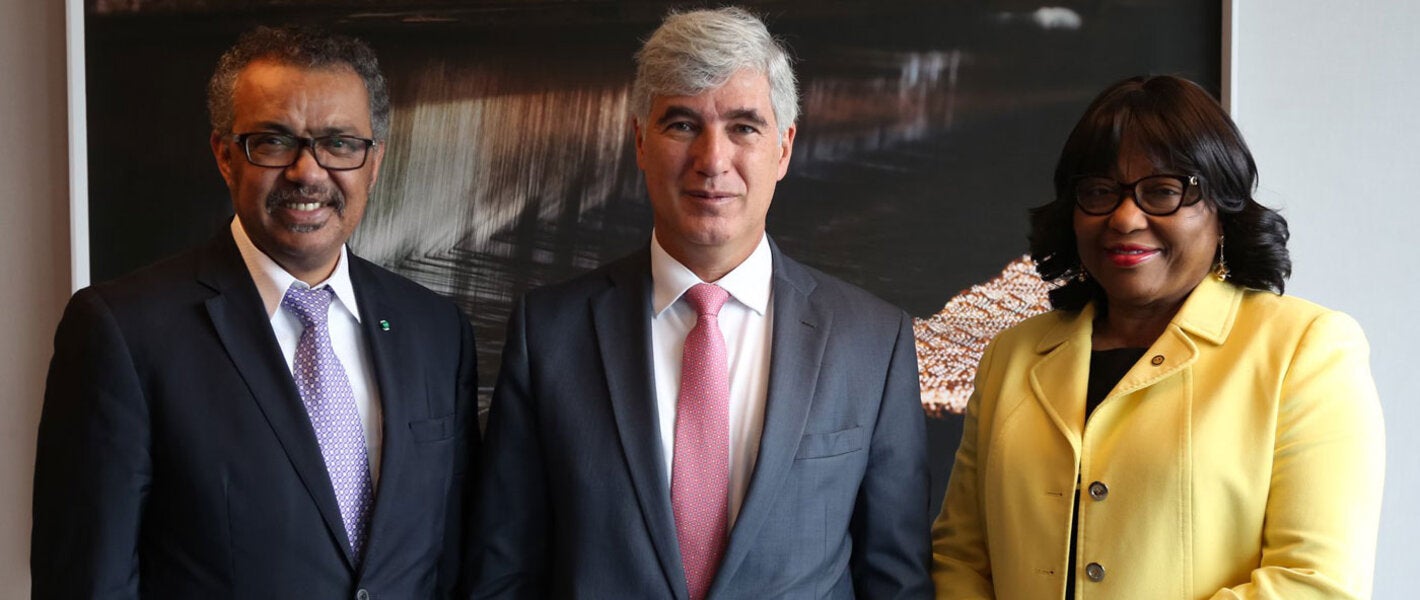
Bogotá, 15 April 2019 (PAHO)- The Colombian Minister of Health and Social Protection, Juan Pablo Uribe Restrepo, today presented the country’s strategic health priorities to the Director General of the World Health Organization (WHO), Dr. Tedros Adhanom Ghebreyesus, and the Director of the Pan American Health Organization (PAHO) and Regional Director for the Americas of WHO, Dr. Carissa F. Etienne.
“Non-communicable diseases, such as cancer, are among the leading causes of death and are therefore a priority, as are mental health, maternal and child health, HIV and tuberculosis,” said the Minister. He also identified financial sustainability, quality of health services and health inequities as challenges to be addressed. “The situation of migrants is a particular challenge,” said Uribe, noting that “PAHO has provided a lot of assistance, particularly in the control of infections such as measles.”
According to national authorities, Colombia has 1.2 million registered migrants. In 2018, the country provided 800,000 medical appointments to more than 200,000 people of Venezuelan origin. The health sector of the country has been responding to migration since 2015 and has recently strengthened its plan. However, the increased demand for services has led to an additional burden on primary health care centers and local hospitals.
“considering health a human right and enshrining it in its constitution”
The Director General of WHO recognized Colombia for “considering health a human right and enshrining it in its constitution.” He highlighted the health system’s focus on primary health care because “it is through primary care that communicable and noncommunicable diseases can be addressed.” Primary health care is also a key strategy for achieving universal health.
Dr. Etienne congratulated Colombia for its “openness and acceptance of migrants,” and assured PAHO/WHO’s continued support to the country in addressing this phenomenon. She also highlighted that for the Region, “achieving the goal of universal health with an emphasis on access and coverage is very important,” and acknowledged Colombia’s progress in this regard.
Dr. Tedros and Dr. Etienne are in Colombia this week to participate in the Meeting of the Organization’s Global Policy Group, an internal advisory mechanism to ensure the implementation of decisions, policies and strategies aligned at all levels of WHO.
More health coverage, but with inequities in access
The Minister of Health and other officials discussed the issue of health coverage in the country. “Colombia has advanced in terms of coverage and social protection, but we still have challenges in terms of financial sustainability, access and quality of care,” said the Minister. He also highlighted the need to overcome inequities and close gaps that hinder access in hard-to-reach, indigenous communities.
The Deputy Minister of Health, Iván Darío González, presented the Integrated Territorial Action Model that aims to expand access to care. “This model seeks to strengthen local authorities and involve the community in joint work to develop plans that improve the health of the population,” he explained. In order to achieve this, the health needs of each territory will be identified in order to direct assistance provided by the Ministry of Health accordingly.
Following the presentation, Dr. Tedros, Dr. Etienne, Minister Uribe, and other authorities from Colombia and WHO/PAHO visited the National Cancer Institute to learn first-hand about the institute’s work in the prevention, detection and treatment of cancer, which is the second highest cause of death in Colombia.



